The remarkable life of lawyer Samuel Vermeulen
-
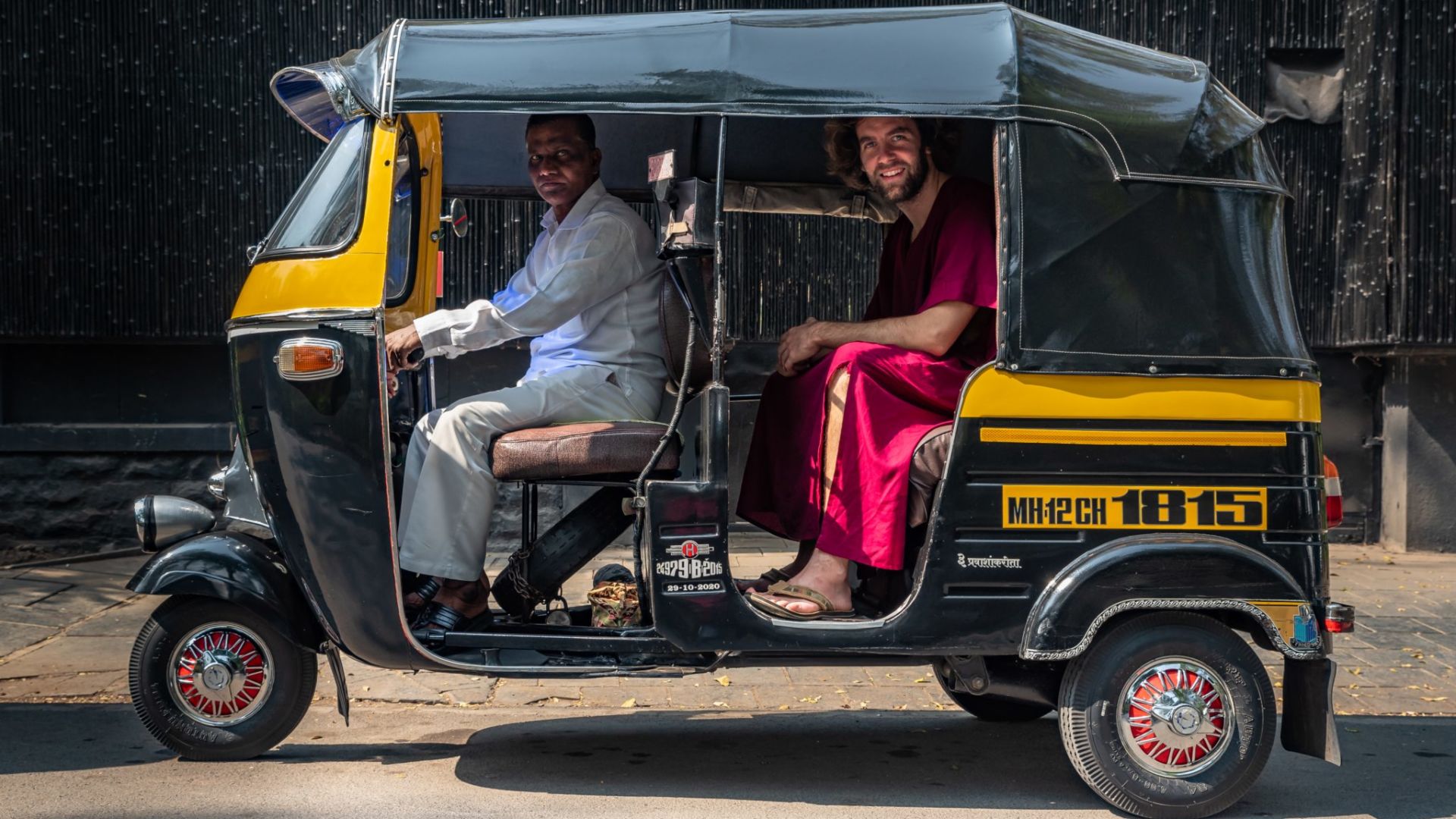 Samuel in India, 2018. Photo: Harry Varma/Hollandse Hoogte
Samuel in India, 2018. Photo: Harry Varma/Hollandse Hoogte
Samuel Vermeulen, lawyer by profession, grew up in a commune. As a student he joined the Nijmegen fraternity T.H.O.R. It’s not that different, he says. ‘Eating together, going on holidays together.’ He wrote a book about his turbulent youth and Nijmegen student days.
In lawyer Samuel Vermeulen’s (33) earliest memory he’s four years old, sitting on his father’s shoulders and watching Bhagwan’s body being carried on a bier through the crowd. The Indian guru Bhagwan (later known as Osho) lies under a blanket of roses, a pearl-embroidered cap on his head. His body is placed on the funeral pyre with clothes and all. People are dancing, in white robes. There’s singing and weeping.
Vermeulen was born in a commune in Beuningen, near Nijmegen. Every year, his parents spent the winter in Poona, India. With other Bhagwan followers they formed a mini-society (ashram) in which free love and meditation were key ingredients. They lived, worked and cooked together.
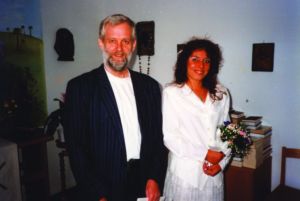
Back in the Netherlands, his parents lived separately in various communes. His father had studied Medicine and worked as a GP. Vermeulen lived with his mother, but after Bhagwan’s death she developed a psychosis and was committed to a psychiatric hospital. The young boy moved to Amsterdam with his father, who unfortunately only had attention for himself and his new girlfriend, an alcohol and heroin addict and ex-prostitute. During a trip to Hungary, the couple is arrested for drug trafficking. Little Samuel, a passenger in the car, finds temporary refuge at his grand-mother’s house in Valkenswaard. His father is imprisoned, and shortly afterwards Vermeulen’s uncle and aunt in Enschede volunteer as foster parents. They get a six-year old with rotting baby teeth, too small shoes, and a severe separation trauma. ‘My parents should never have had children,’ Vermeulen shares in a recent interview in the Algemeen Dagblad.
‘For the first time in my life, I’m happy with who I am’
Bored and recalcitrant, Vermeulen gives his foster parents a hard time, but he has no trouble passing his pre-university (VWO) exams. He moves to Nijmegen to study Law and Business Administration. In Nijmegen he joins the T.H.O.R. fraternity. You’d think the contrast couldn’t be greater. Bhagwan versus student fraternity. He laughs. ‘I had no idea what a fraternity was, you know.’
Prince
Today, on a rainy Thursday in May, we stand in front of his former student house on the Bijleveldsingel. Samuel Vermeulen moved to Amsterdam years ago, and he’s used to giving interviews by now. Last year, he published an autobiography about his bizarre childhood. The title refers to the name he was given by Bhagwan himself: Swami Prem, which means Prince of Love. The book, which also features his Nijmegen student days, marks the final stage in an intensive therapeutic process that took him three years to complete. The successful lawyer turned out to be more hurt than he knew.
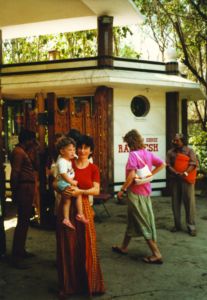
But to get back to that fraternity. How did he end up there? ‘Very simple,’ he says. ‘I responded to an ad for a room on Kamernet.nl. It was only on the evening of the interview that they told me the new tenant would have to join their fraternity. I’d never even heard of the word. They said they did a lot of activities together. It sounded like fun to me.’
Vermeulen locks his OV bicycle. A student opens the door. ‘Hi Samuel. Fancy a beer?’ It’s 3 pm. No, thanks. With quick steps he climbs the stairs of his former home. Sports socks in the hallway, fraternity ties on the doors. Not much has changed. Samuel explains he soon felt at home at T.H.O.R. ‘In a way, there’s not that much difference between a commune and a fraternity. Both involve a group of individuals who have a common denominator and use it as a basis to create a community. Exercising together, eating together, and going on holidays together. It all felt very familiar to me.’ He’s just returned from a week of cycling in Italy with eight friends, half of them fellow fraternity members.
The portrait gallery in the hallway still includes a black-and-white portrait of Samuel. ‘I think it was taken in my first year. I’m guessing this from looking at my hair, I’d started to let it grow.’ When he lived with his foster parents, he wore his hair short. They were strict with him. A good thing too, he reflects out loud, or he would have completely gone off the tracks.
Spirituality
The Samuel Vermeulen standing here today is completely different from the one who studied in Nijmegen 15 years ago, he says. Law turned out to fit him like a glove. He was a man of logic and reason. And yes, it was also an allergic response to his parents’ dramatical head-in-the-clouds attitude. Bhagwan followers spent much of their time cuddling and meditating. ‘I thought feelings and spirituality were complete nonsense,’ he says. For a long time, he kept up the illusion that he could manage fine without.
As he opens the bathroom door (hair in the shower drain), he shares that in his days the fraternity house was nominated by Vox as dirtiest student house in Nijmegen. ‘Ha ha, we even won a free cleaning spree as a result. It was cleaned very thoroughly and professionally.’
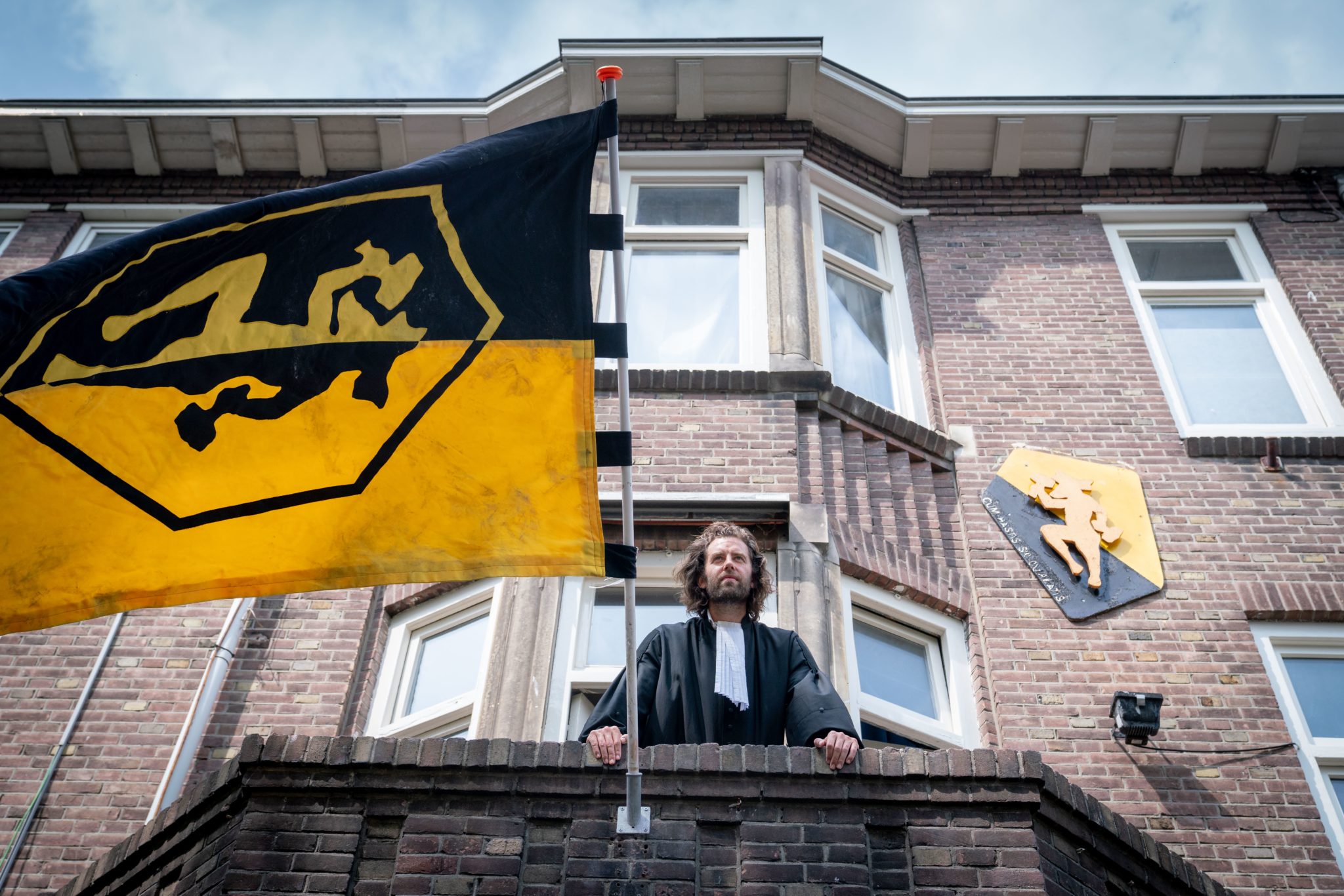
His book also contains more thrilling details about his student life. How he and a fellow fraternity member stole a van to drive back to Nijmegen from a party in Mill. The keys had been left in the dashboard, and the two planned to park the car on the corner of the fraternity house and make an anonymous report to the police. Their plan failed. On St. Annastraat, the two students were intercepted by police officers, who dragged them out of the car at gunpoint and arrested them. Vermeulen was sentenced to community service.
‘I had to do two and a half days of hoeing on an industrial site.’ He grins. He’d never held a hoe in his life. But come on, don’t forget these were first-year students! Then, more seriously: ‘I did learn from it, it was the last time I did anything like that. Fraternities kind of suggest to their members that they can get away with anything. They have an attitude of ‘we’re untouchable because we’re students’. Those hours of community work certainly taught me otherwise.’
‘I thought feelings and spirituality were nonsense’
In Prins van Liefde (Prince of Love), he describes how he worked as a night porter at Hotel Belvoir, drinking expensive whisky with his fraternity buddies all night. He talks about the phone jokes he played, scaring his unsuspecting victims to death (‘Hello Mrs So-and-So, I’d like to inform you that your house is due to be sold by way of execution’).
He thought of himself as uninhibited. When his father died in 2014, Vermeulen found a box of his diaries, and discovered that restlessness ran in the family. ‘I was shocked. I began to read and saw a copy of myself. My father was also intelligent and successful until his thirties. It was only later that he lost his way.’
Vermeulen read about how lonely his father felt, how he’d been neglected as a child, and craved love as a result. It was like reading his own story. After his father was released from prison, he got lost in heroin – he even once asked eight-year old Samuel to hold the lighter under the piece of aluminium foil with the words ‘now you know how to Chase the Dragon!’. Alcohol and psychoses further destroyed his life. Vermeulen was thirty and looked at himself in the mirror. From the outside, he looked brilliant, but how frayed was he on the inside?
Robot
In the second year of his studies, Vermeulen launched a call centre in Nijmegen together with a friend. He was bored in his studies and was looking for something new. They hired approximately thirty students, and made lots of money. Vermeulen wore tailored suits worth € 1500 apiece. Success became his drive, he was sensitive to applause (‘which I confused with love’).
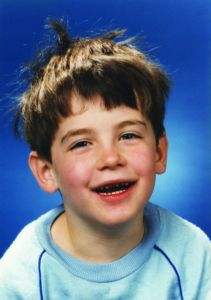
When he genuinely became hungry for academic knowledge, he sold his shares and started studying in earnest. ‘I took advantage of pretty much every opportunity the University offered,’ he explains. United Netherlands, the Honours Programme, and an additional Master’s programme in History. Samuel developed a kind of performance addiction. He wanted to be the best in everything.
After completing his Law degree with a cum laude distinction, he went on to study at the prestigious Cambridge University. He then followed internships at the Ministry of Foreign Affairs and the Yugoslavia Tribunal, before finally ending up at the Amsterdam Zuidas. He was offered a job at the biggest law firm in the Netherlands: De Brauw, Blackstone and Westbroek. Workweeks of seventy hours were the norm, swallowing a pill on weekends was just part of Amsterdam life. ‘I was a robot.’
When his father died and Vermeulen read his memoirs, all his childhood memories rushed back to the surface. He felt shaky, and went into therapy. ‘Together with my psychologist I decided to write a book. I had all my father’s diaries and letters typed out, and I took a sabbatical from the law firm.’
India
In 2017, Vermeulen decided to return to Poona, India. What were his parents looking for there? What had their life in the ashram been like? Upon arrival he was asked to change into a red robe, which felt strange. He was there for an Osho course. ‘I thought it would be something with a PowerPoint presentation. On the morning of the first day, I walked into the room: just an empty space with cushions on the floor. I asked the course facilitator ‘What shall I do?’ He put on some music and said ‘just start dancing’. I looked at him. ‘It’s 9 am, dude, I’m totally sober. What kind of crazy idea is that?’
‘I don’t idealise fraternity life’
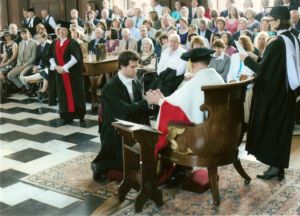
But he did end up dancing, as unobtrusively as possible, in a corner. The course facilitator took his hands and put them into those of an unknown woman, in whose eyes he was asked to keep looking. He danced with her, feeling clumsy and uneasy. But it was good, he could feel it, even though he didn’t really know why. Back at the commune, the first tears came. Samuel the Robot slowly fell apart.
He went back to India for a Tantra course. Gave himself over to the spirituality he had always found so ridiculous. ‘The sannyasins (Bhagwan followers, AH) my parents spent time with in the Netherlands were all unemployed and hardly able to meet their own needs. I thought all spiritual people were like that. It turned out to be totally wrong. In the ashram I met successful psychologists, architects, and lawyers. They all had their lives in order.’
And now? These days, Samuel Vermeulen feels better than ever. Thanks to therapy, thanks to his book, thanks to India. He’s lost his longing for success. ‘For the first time in my life, I’m happy with who I am. I can be alone without feeling like the walls are closing in on me. I used to feel no empathy, I know that now. I needed people to fill a hole in me, which meant I could never give them my full attention. The beauty of people and things escaped me.’
Once his book was published, he quit his job at De Brauw. He no longer wanted to work on million euros cases for multinationals, with all contact taking place via email. He launched his own company. ‘As a lawyer I now only take on small cases that I enjoy, for a few days a week.’ This summer the former fraternity member is legally representing T.H.O.R. The current tenants of the fraternity house are at risk of being evicted by the Municipality, and he’s trying to forestall eviction on behalf of the house owner (see box).
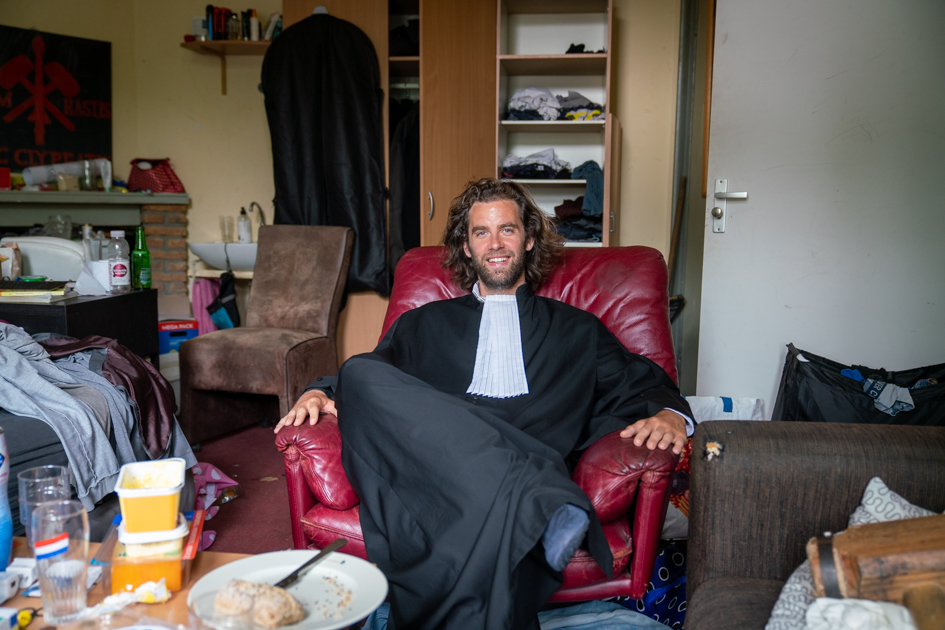
In Amsterdam, he’s also active as a real estate developer. In his free time, he plays tennis, cycles, goes to the theatre, and meditates. He’s not planning to return to his old life. ‘I’ve had a taste of freedom. My life is so much broader and richer now.’ Self-development has become a key pillar of his existence, as was the case for his parents. Does he still blame them? ‘I still find it difficult to be angry at them.’ They were looking for something they never found. His mother is still in a psychiatric hospital.
Having completed the tour of his former student house, Vermeulen closes the door. He’s grateful to the fraternity for the friends he met there, some of them friends for life. His years in Nijmegen formed him. ‘But,’ he says, ‘I don’t idealise fraternity life, as I see some former colleagues do.’ And he still has problems with rough hazing practices – ‘senior students who suddenly start shouting at you’.
Counsellor in the T.H.O.R. Case
Samuel Vermeulen currently acts as counsellor in the impending eviction of the current tenants of the fraternity house. The Municipality of Nijmegen has refused to legalise the permit for room rental at the Bijleveldsingel 80. According to municipal officers, T.H.O.R.’s landlord doesn’t have his papers in order, and a student house is undesirable at this location because of inconvenience to the neighbours. Vermeulen is challenging this, arguing that the permit should have been granted, and is technically speaking not even necessary. The case was heard on 4 June. The judge will rule on 5 July. If the appeal fails, the landlord still has the option of bringing the case to court. If he loses, the students will have to leave the fraternity house.


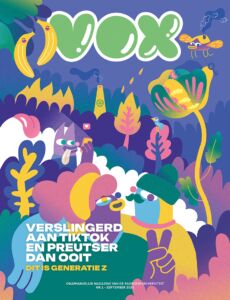
aaj schreef op 7 februari 2020 om 21:24
story of Samuel Vermeulen cannot be shared on FB